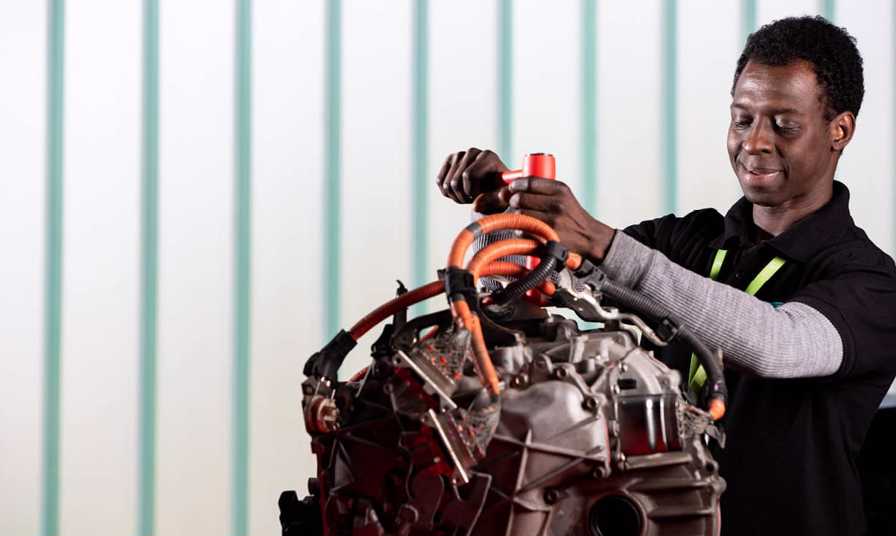Entry Requirements
Undertake an initial assessment and Apprentices who do not have a minimum of Grade 2/3 GCSE or Level 1/2 Functional Skills in English and Maths will need to work towards and achieve Functional Skills Level 1.
Study Mode
Part time
Duration
30 Months Plus 3 Months EPA, Off the job hours 605
Key features and Benefits
- Skills Provider of the Year - BiBAS Winner 2025
- Fantastic learning facilities
- Study at one of the Top 3 Colleges in England*
- Ofsted Grade "Good" - Nov 24
-
Overview
An Auto-care Technician carries out a range of services and repairs to cars, car derived vans and light goods vehicles, working in an Auto-care or “Fast-Fit” Centre, which may be part of a national chain or operated by a regional/local independent group/owner. An Auto-care Technician requires a unique combination of technical, retail and customer service skills. They will use a range of tools, measuring and diagnostic equipment to identify & repair simple system faults.
The Auto-care Technician has to demonstrate expertise not only in the technical elements of their role and have a good grasp of the practical and theoretical aspects of the vehicle systems they service, but also needs to have excellent telephone, customer handling (including how to handle difficult customers and deal with customer disappointment) and effective sales skills, as well as strong problem solving and self-organisation skills. They must be able to work as part of a team but also operate independently, understand how their centre operates from a commercial perspective and how their actions contribute to business results, whilst maintaining a high standard of workmanship.
-
What will I study?
An Auto-care Technician will demonstrate a knowledge and understanding of the following:- Tyre legislation and technical information including EU Tyre labelling
- Tyre Pressure Monitoring systems, sidewall markings, homologated fitments relating to cars, car derived vans and light goods vehicles.
- Fundamentals of specific vehicle systems including steering & suspension, braking systems, battery & charging systems, exhaust systems and Air-Conditioning systems
-
Vehicle 4-wheel geometry principles
-
Basic consumer legislation relevant to the occupation
-
Appropriate Health & Safety legislation and requirements for the workplace
-
Hybrid/Electric Vehicle system and safe working procedures
-
Data protection requirements to protect customer and payment information
-
General sales principles including, identifying customer & vehicle needs, presenting solutions, closing the sale and dealing with buying resistance
-
How the business works and how you contribute to the overall results, demonstrating commercial awareness
-
How to carry out vehicle safety inspections and routinemaintenance using manufacturers specifications or approved schedules, using vehicle specific data and meeting legal requirements
-
The importance of following work place procedures and the consequences of not doing so.
-
The competency to achieve the following skills in the workplace:Contribute to maintaining a healthy and safe workplace, including the maintenance of key equipment and carrying out general housekeeping
-
Carry out stock procedures including dealing with routine stock deliveries, placing stock into storage, carrying out stock rotation duties and ordering parts for customers following company procedures
-
Carry out vehicle safety inspections and routine maintenance in line with manufactures specifications or approved schedules, company procedures and complete approved documentation.Make recommendations to customers based on the results of inspections
-
Carry out replacement/repair and balancing of a range of light vehicle tyres, including ultra-low profile, directional, asymmetric and run-flat tyres fitted to a range of wheel sizes and typesCarry out the replacement of components on a specific range of vehicle systems including Steering & Suspension, Braking systems, Battery & Charging systems, exhaust systems and Air-Conditioning systems
-
Carry out 4-wheel Geometry operations including adjustments on a range of vehicles with different suspension and steering systems
-
Use a range of specialist tools & equipment, mechanical & electrical measuring tools and diagnostic equipment to support fault identification and repair.
-
Identify & procure correct parts to meet specific customer requirements
-
Access vehicle technical data to inform inspections and make judgements on wear and serviceability.
-
Deal with and resolve low-level customer complaintsCommunicate effectively with customers, suppliers and colleagues
-
Use specific company IT systems within the workplace, including Point-of-sale systems and hand-held devices.
-
Entry Requirements
Apprentices without Level 1 English and maths will need to achieve this level and take the test for level 2 prior to taking their apprenticeship end-point assessment.
-
How will I be assessed?
You will be observed both in college and in the workplace throughout the apprenticeship, you will complete written and oral questions, learn how to take part in professional discussions and complete reflective journals.
The End Point Assessment includes a practical observation, professional review (supported by a portfolio of evidence) and knowledge assessments.
-
Explore Your Career Options
Click on each of the Careers to explore more - from top salaries to job descriptions
-
What can I study next
-
Apprenticeship Funding
When you start an apprenticeship with us, there’s no need to worry about the cost—apprenticeship fees and funding are covered by your employer, not you. This means you can focus fully on gaining valuable skills and experience without any financial burden.
For more information on apprenticeship funding/costs and any government support available, please contact our Apprenticeship Team on 01254 292500 or apprenticeships@blackburn.ac.uk

99.4% Apprenticeship End Point Assessment Achievement
Results 2025













